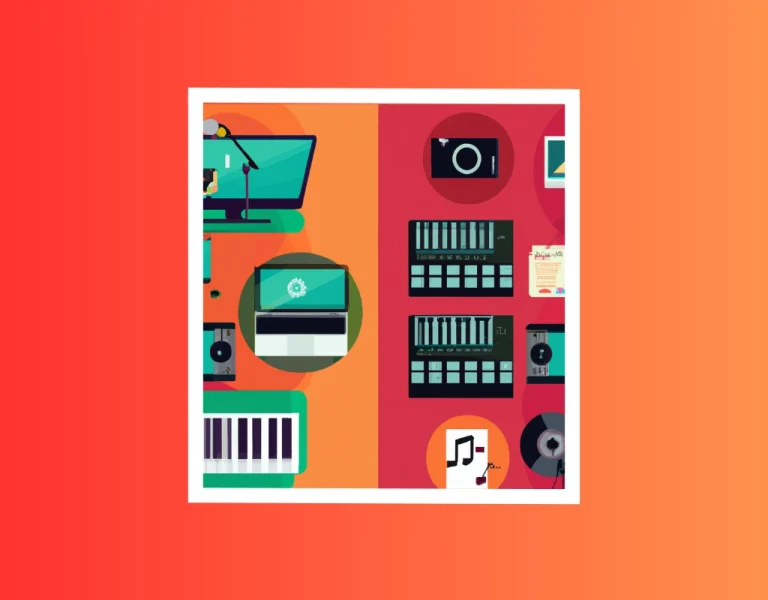Can Songwriting Be Learned? (Quick Facts)
Have you ever wondered if songwriting is a skill that can be learned?
Many people are fascinated by the idea of creating their own music and lyrics, and the art of songwriting can be intimidating for some. However, like any other craft, songwriting can indeed be mastered with time, practice, and dedication.
To begin, it’s essential to understand that songwriting is a process that involves various elements such as melody, lyrics, rhythm, and structure.
By diving into each aspect of music creation, you can gradually build a foundation and develop your skills. Remember, even the most renowned songwriters had to start somewhere, so don’t be afraid to embrace the learning journey.
Here are some key steps to start learning songwriting:
- Listen to a wide range of music to get inspired.
- Learn the fundamentals of music theory.
- Start writing lyrics and melodies.
- Experiment with different song structures.
- Collaborate with other musicians and learn from their techniques.
- Consistently practice and revise your work.
As you delve deeper into the world of songwriting, you’ll find that there isn’t a strict formula for success. Instead, it’s about finding your unique voice and refining your craft. So, go ahead and explore the wonders of music and unleash your creativity. You might just surprise yourself with what you can achieve.
Table of Contents
Can Songwriting Be Learned?
Innate Talent vs. Learnable Skill
You may be wondering if songwriting is a gift you’re born with or if it’s a skill you can develop over time. The truth is, it’s a little bit of both. Some people may have a natural flair for melody or lyricism, but that doesn’t mean they’ll automatically become great songwriters. On the other hand, you can learn the techniques and principles of songwriting and, with time and practice, develop your own unique style.
It’s important to note that talent is only one part of the story. Even those with innate talent must work hard to refine and grow their abilities. And, for those who may not have been born with a natural gift, a commitment to learning and practicing can lead to great songwriting.
Truths about Learning Songwriting
While there isn’t a one-size-fits-all approach, several key truths can guide you as you embark on your songwriting journey:
- Learning is an ongoing process: Just like any other skill, you will never truly be “done” learning how to write songs. With every new song you write, there is an opportunity to improve and grow.
- Study the greats: To become a skilled songwriter, it is crucial to learn from the best songwriters out there. Study their work and learn how they’ve crafted their lyrics, melodies, and arrangements.
- Write, write, write: The more you practice, the better you’ll become. Experiment with different styles, genres, and ideas. Write about anything and everything you feel passionate about.
- Accept feedback: Seek out honest feedback from friends, family, or mentors who can help you improve. Remember that constructive criticism is meant to help, not hurt.
- Be patient: Developing your songwriting abilities takes time, and it’s essential to remain patient as you learn and grow.
In summary, while some people may have a natural talent for songwriting, it is a learnable skill that will improve with practice and hard work. Embrace the journey and continually aim to better your craft so that you can express your thoughts, feelings, and experiences through the power of music.
The Songwriting Process
When it comes to learning the art of songwriting, understanding the songwriting process is crucial. In this guide, we’ll explore the key components that make up a song, providing insights and tips along the way.
Melodies
Melodies are the backbone of your song, providing the tune that will linger in your listener’s mind.
To create a compelling melody, start by experimenting with different note patterns and rhythms until you find one that resonates with you.
Don’t be afraid to explore various musical scales and modes – these can help give your melody a unique flavor. Remember, simplicity is often the key to a memorable melody.
Lyrics
The heart and soul of your song lies in its lyrics.
To write engaging lyrics, begin by reflecting on your emotions or experiences to find inspiration for your content. It’s essential to be authentic and honest in your writing, as this will help create a strong emotional connection with your listener.
Practicing your rhyming skills and using different literary devices can make your words stand out while conveying your intended message effectively.
- Tap into your emotions
- Be honest and authentic
- Practice rhyming
- Use literary devices
Chords and Progressions
A solid chord progression serves as the foundation for your song, supporting the melodies and lyrics.
To craft an effective chord progression, familiarize yourself with common progressions used in various genres and your personal preferences.
Experiment with different combinations of chords to find a progression that complements your melody and lyrics. Keep in mind that sometimes, a simple progression can be just as powerful as a more complex one.
| Common Chord Progressions |
|---|
| I – IV – V |
| ii – V – I |
| I – V – vi – IV |
Song Structure
The structure of your song is crucial in guiding your listener through each section. A well-structured song typically consists of several components, such as the verse, chorus, bridge, and an optional pre-chorus. Familiarize yourself with song structures in your chosen genre to understand what works best for your music. Don’t be afraid to experiment with different formats to find the right layout for your song.
- Verse
- Chorus
- Bridge
- Pre-chorus (optional)
Remember that practice is key as you continue to hone your songwriting skills.
Embrace the creative process, learn from your experiences, and stay true to your unique style. You’ll find that over time, the process of songwriting will become more intuitive and rewarding.
Improving Your Songwriting Skills
Listening and Analyzing
To improve your songwriting skills, one of the essential steps is to actively listen and analyze music.
By listening to a variety of songs, you’ll become more familiar with various chords, lyrics, and writing skills.
When you listen, try to think about what makes a song great and how you would approach it differently.
Paying attention to chord progressions and memorable melodies can provide valuable learning opportunities for your own songwriting journey.
Some tips to enhance your critical listening skills include:
- Comparing different versions of the same song
- Identifying the emotions invoked by various song elements
- Listening to songs from different genres and eras
Experimentation and Creativity
Creativity is crucial in songwriting.
Take some time to experiment with your new knowledge gained from listening to and analyzing different songs.
Try out different combinations of chords, lyrics, and melodies to create something unique.
Using tools like recording software or a video camera, capture your results for progress tracking and self-analysis.
To boost your creativity, consider the following:
- Writing without worrying about structure or rules, then refining later
- Collaborating with other composers or musicians
- Branching out by using unconventional instruments
Practice and Patience
As with any skill or craft, practice is vital in developing your songwriting abilities.
Set aside regular time to write and revise your songs, focusing on both lyrics and music.
Practicing consistently will help you sharpen the required techniques and increase your understanding of song structure, melody, and harmony.
Patience is equally important.
Progress may be slow at times, but it’s essential to remain dedicated and keep pushing forward.
Remember that even the most accomplished songwriters started with simple ideas and grew over time.
Here’s a list of simple practices to follow:
- Set achievable goals and track your progress
- Record your practice sessions to analyze and improve
- Seek feedback from others and apply it constructively
By incorporating active listening, experimentation, and consistent practice into your routine, you’ll be well on your way to honing your songwriting skills. The journey may challenge you, but remember, patience and persistence will yield rewarding results.
Songwriting Resources
Books and Blogs
A wealth of knowledge is available for those looking to learn or improve their songwriting skills.
The internet, particularly, provides numerous blogs for budding songwriters, such as Songwriting Pro and Songwriting World, which share tips, advice, and inspiring stories from experienced professionals.
Additionally, there are scores of insightful books on songwriting that cover various aspects of the art—from melody-writing and music theory to lyrics and song structure.
To get you started, here’s a list of recommended songwriting books:
- Writing Better Lyrics by Pat Pattison
- How to Write a Hit Song by Molly-Ann Leikin
- The Everything Songwriting Book: All You Need to Create and Market Hit Songs by C.J. Watson
Online Courses
Numerous online courses cater to songwriters at various stages of their journey. These courses offer instruction in music theory, song structure, and crafting a catchy melody.
Some popular platforms for finding online songwriting courses include Coursera, Udemy, and Skillshare.
By investing time in these resources, you can quickly develop your skills and gain a broader understanding of how to create memorable and impactful songs.
Songwriting Workshops
Songwriting workshops are an excellent option for those who prefer a more hands-on learning experience.
Workshops offer an opportunity to receive guidance and feedback from experienced teachers in a supportive environment.
Many schools and organizations host regular songwriting workshops, both in-person and online. By participating in workshops, you’ll benefit from direct interaction with fellow songwriters, critiques, and advice from industry professionals.
Additionally, you’ll be able to network and build connections with other aspiring songwriters who share your passion.
Remember, songwriting is a skill that can be learned through dedication, practice and a genuine interest in the process. By utilizing the resources listed above and embracing the journey, you’ll progress in your songwriting abilities and gain the confidence to share your music with the world. Happy writing!
Conclusion
So, can songwriting be learned? The answer is a resounding yes.
Everyone has their unique creative process, but the foundation of songwriting – the lyrics and the music – can be improved through practice and learning.
You might be feeling overwhelmed, but trust us when we say that songwriting is not some impossible talent reserved for a chosen few.
Like any other skill, it takes dedication and patience to develop. Remember, practice makes progress, and with each song you write, you’ll learn more about how to express yourself through music better.
Now that you’ve read this article, you have a great starting point to begin your journey into songwriting.
Embrace the challenge, enjoy the process, and know that you’re becoming a better songwriter with every step. You got this!
FAQ: Can Songwriting Be Learned?
Learning to write songs may seem daunting, but with practice and dedication, anyone can develop the skills to become a successful songwriter. Here are some frequently asked questions about learning to write songs.
Is it possible to learn to write songs without any prior musical knowledge?
While having some musical knowledge can be helpful, it is not a requirement to learn to write songs. With dedication and practice, anyone can develop the skills to write great songs.
How long does it take to learn to write songs?
There is no set timeline for learning to write songs. It can take weeks, months, or even years to develop the skills necessary to create great songs. The key is to practice regularly and be patient with yourself.
Do I need to be a good singer to be a songwriter?
No, you do not need to be a good singer to be a songwriter. Many successful songwriters do not have strong singing voices but focus on their writing and collaborate with others to bring their songs to life.
Can songwriting be a career?
Absolutely! Songwriting can be a career path for those who are dedicated and willing to put in the work. There are many opportunities available in the music industry for talented songwriters, such as writing for other artists, composing music for film and television, or producing your own music.
What resources are available for those interested in learning to write songs?
There are many resources available for those interested in learning to write songs, including online courses, workshops, books, and mentorship programs. Experimenting with different genres and collaborating with other musicians can also be a helpful way to develop your skills.
Remember, the key to becoming a successful songwriter is to practice regularly, be open to feedback, and stay true to your creative vision. With dedication and hard work, anyone can learn to write great songs.







